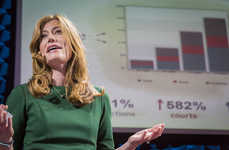
Jennifer Golbeck Keynotes
Jennifer Golbeck's scientific keynotes explain how researchers can easily use consumer social media...

Need Inspiration?
Get inspired by 4,000+ keynote speaker videos & our founder, a top keynote speaker on innovation.
Jennifer Golbeck's Scientific Keynote Explains How Researchers Use Data
Janelle Savel — April 7, 2014 — Keynote Trends
References: cs.umd.edu & youtube
Jennifer Golbeck's scientific keynote explains "The Curly Fry Conundrum" and why social media has more of an impact than you think.
Golbeck and other researchers are able to predict attributes about a person based on their data. There is a pattern of behavior known as homophily -- it is the tendency of individuals to associate with similar people -- and Facebook 'likes' can be used to predict attributes, even through seemingly irrelevant 'liked' pages. Intelligent people will 'like' the pages that their intelligent friends like, and it will continue to spread accordingly. These patterns can predict political preference, how much you trust people, your relationship with others and even your bad habits and vices.
Golbeck mentions that consumers have no control of how companies and researchers use their data. She thinks that this is unfair, and users should have the option to share their data, even if it impedes useful research. Her goal is not to infer information from users but to improve the way people act online. This genuine honesty will allow consumers to feel more secure, and if they know they have the option to share, they will be more likely to willingly participate.
Golbeck and other researchers are able to predict attributes about a person based on their data. There is a pattern of behavior known as homophily -- it is the tendency of individuals to associate with similar people -- and Facebook 'likes' can be used to predict attributes, even through seemingly irrelevant 'liked' pages. Intelligent people will 'like' the pages that their intelligent friends like, and it will continue to spread accordingly. These patterns can predict political preference, how much you trust people, your relationship with others and even your bad habits and vices.
Golbeck mentions that consumers have no control of how companies and researchers use their data. She thinks that this is unfair, and users should have the option to share their data, even if it impedes useful research. Her goal is not to infer information from users but to improve the way people act online. This genuine honesty will allow consumers to feel more secure, and if they know they have the option to share, they will be more likely to willingly participate.
1.6
Score
Popularity
Activity
Freshness
















